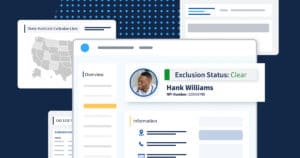While healthcare systems are yet again being slammed with COVID-19 cases (over 100,000 hospitalizations in December 2020), hospitals are finding themselves in a desperate hunt for available frontline nurses. With increasingly high numbers of patients and such a short supply of nurses, many healthcare systems are relying on traveling nurses to relieve their exhausted staff.
But travel nurses prove a challenging population for ongoing compliance and credential monitoring. In this post, we’ll explore the nuances of ongoing license and credential management for travel nurses.
The Travel Nurse Credentialing Cycle
Licensing & Credentialing
Healthcare staffing agencies provide numerous services to healthcare providers. Once a travel nurse is considered for placement at a given healthcare facility, the agency will screen the candidate. Screening includes evaluating their experience, employment references, and skills, plus running background checks.
Agencies also help with credentialing and compliance services, ensuring that the required licenses and certifications are active and in good standing. This includes ensuring that their credentials have not expired, that all their required medical tests and screenings (physical exams, immunization records, and drug screens) are current and in compliance with the healthcare provider’s standards. If the documents don’t meet the hospital’s requirements, then the travel nurse and the agency must work together to ensure that the required documents are obtained in time to meet the deadline.
Exclusion Monitoring
Although agencies play a significant role in credentialing, exclusion monitoring is ultimately the healthcare provider’s responsibility. If a traveling nurse is working at a given hospital, that nurse is treating patients on behalf of the provider organization. That’s why it’s important to add these nurses to your ongoing exclusion monitoring environment.
Read more about how ProviderTrust’s Smarter Monitoring detects exclusions in your populations that other solutions can’t. Check out our Exclusion Monitoring Solution Guide.
Risk Associated With Travel Nurses
As the largest category of licensed caregivers, nurses are also the most commonly excluded discipline. High demand and turnover mean they often move around. Interstate moving is a crucial strategy for outrunning disciplinary sanctions and exclusions. Given the delays in reporting disciplinary and administrative license actions, ongoing exclusion monitoring with data enrichment is the best way to protect your organization and patients from bad actors outrunning sanctions.
The Role of the Nursing License Compact
The NLC is a multi-state agreement that allows nurses to practice in any participating state. Known as one of the most popular and widely-supported compacts in the country, it enables nurses to move across the country without obtaining any additional licenses. Also, as in critical times, such as throughout a pandemic, it helps nurses quickly move through states to provide emergency care on short notice. If a nurse should happen to live in a non-compact state, he/she will have to apply for a single-state license. Nurses licensed in a compact state are eligible for a multi-state license, which allows them to practice in any compact state without taking on additional fees or licenses.
For nurses moving from a compact state to a non-compact state or moving from a non-compact state to another non-compact state, the process is complicated (to say the least). For this reason, providers should pay close attention when investigating whether or not their travel nurses have the correct licensure.
These “compact states” below participate within the NLC:
- Idaho
- Montana
- Utah
- Arizona
- New Mexico
- Colorado
- North Dakota
- South Dakota
- Nebraska
- Texas
- Iowa
- Missouri
13. Arkansas
14. Wisconsin
15. Kentucky
16. Tennessee
17. Mississippi
18. Maine
19. New Hampshire
20. Rhode Island
21. Delaware
22. Maryland
23. Virginia
24. North Carolina
25. South Carolina
COVID-19 License Waivers
In March 2020, the Centers for Medicare and Medicaid Services (CMS) released a series of temporary waivers in response to COVID-19. One of the waivers has allowed for more flexibility with physicians and other healthcare professionals to provide services in states in which they’re not licensed. While this removes previous compensation issues, it doesn’t preempt the state law. State licensure laws still apply, permitting states to take a range of actions to provide more flexibility concerning their local licensing laws to meet patient care needs.
As traveling nurses and other healthcare professionals are part of the group closely affected by this flexibility, there’s also cause for concern. According to USA Today, “emergency actions against doctors’ licenses dropped 59% from April through June of this year compared with the same period last year.” Several contributing factors to the declines in disciplinary actions included state funding and layoffs at medical boards, COVID-19 shutdowns, remote work challenges, physician shortages, and decreased patient encounters. With fewer license Board actions, more patients may be at risk.
Fewer board actions against licenses mean credentialing and re-credentialing processes could return fewer eligibility issues in this area. But suppose state board backlogs result in license revocations for any recently (re)credentialed provider in your network. In that case, that issue could go unnoticed for years without ongoing license verification, opening providers up to risk and potentially triggering recoupment efforts.
Best Practices for License Verification Oversight
At ProviderTrust, we implement smarter monitoring to detect license and disciplinary issues faster than any other solution. Our enriched data deliver exact-match alerts that give you full confidence and save HR, Compliance, and Provider Network teams hours .
Get the insight you need via your HRIS, Salesforce, or custom data warehouse to improve operational efficiency, protect your organization, and keep patients and members safe.









